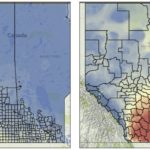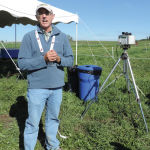Reading Time: 3 minutes Feedlots have come a long way in reducing harmful greenhouse gas emissions in recent years. But a new federal research study has found that nitrogen losses in feedlots are still significant — and can significantly affect the bottom line. “We’re losing about 50 per cent of the nitrogen to ammonia loss in a feedlot, and […] Read more

Half of nitrogen from feedlots is lost to ammonia emission
Mitigating emissions from feedlots isn’t easy, but there are ‘simple’ steps to reduce nitrogen losses and save money
Bocock Brothers receive top dairy award
Reading Time: < 1 minute John and Bill Bocock are the 2016 recipients of the Alberta Milk’s Dairy Industry Achievement Award. The brothers are trendsetters whose dairy careers have spanned decades, and among their contributions to the industry is a donation of 777 acres to the University of Alberta to create the St. Albert Research Station. The station is used […] Read more

Canadian beef industry gets high marks in sustainability assessment
Industry needs to reduce meat waste and improve labour practices, but does well on greenhouse gas emissions
Reading Time: 3 minutes It’s finally complete. The Canadian Roundtable for Sustainable Beef has crunched the numbers and can detail the full impact of what it takes to produce beef in Canada. The National Beef Sustainability Assessment — a first-of-its-kind study — took a comprehensive look at the environmental, social, and economic aspects of beef production. “Throughout the sustainability […] Read more

Southern Alberta could soon have Texas weather
Want to see the climate projections for your county? New online atlas predicts a sweltering future
Reading Time: 5 minutes Western Canada is on an “inevitable” march towards hot, dry summers and mild winters that will make southern Alberta feel like northern Texas, according to a new climate change mapping program. “One of the big, striking conclusions of the atlas is that, even if we reduce emissions, we still see substantial changes to our climate,” […] Read more

Grasslands a carbon-capture colossus
Do the math: Take Alberta $15-per-tonne carbon tax and then look at how much carbon is stored in grasslands
Reading Time: 3 minutes If the Alberta government really wants to reduce greenhouse gas emissions in the province, it should start with an incentive for farmers to reduce annual cropping, says a rangeland management expert. “There’s a pretty compelling case about why there should be a direct economic incentive for producers to maintain or even increase the amount of […] Read more
Federal funding available to help cut farm greenhouse gases
Reading Time: < 1 minute A federal program backing research into farm-level technologies and practices that limit farms’ greenhouse gas emissions has been extended for another five-year run. Ottawa will put $27 million into the next phase of the Agricultural Greenhouse Gases Program, which gave out $21 million in funding to 18 projects in the first five-year phase. Among those […] Read more

Study finds Canadian beef’s GHG footprint shrunk over 30 years
Efficiencies in cattle production and feeding have allowed Canada’s beef industry to produce the same weight in beef as 30 years ago with smaller breeding herds, less land — and smaller greenhouse gas (GHG) output, a new study finds. The study, led by research scientist Tim McAllister of Agriculture and Agri-Food Canada in Lethbridge, with […] Read more

Schoepp: What’s a more important sector: oil or agriculture?
Take a comprehensive look at the facts and the answer is obvious
Reading Time: 4 minutes As we drove through the blueberry fields and cranberry bogs in southern B.C., I thought of economic generators. What, I wondered, was a bigger sustainable economic generator to our nation: oil or agriculture? An environmental scan of an industry must include the long-term effects on people and the planet. The structures that we employ for […] Read more

Cows that burp less could also save you money
Reducing methane from cattle means a reduction in greenhouse gases – and the key to that is feed efficiency
Reading Time: 2 minutes Cows that burp less are also more feed efficient. That’s the initial results of a study conducted by Thomas Flesch, a meteorologist from the University of Alberta and John Basarab, a University of Alberta professor and beef research scientist at the Agriculture and Agri-Food Canada’s Lacombe research station. The two scientists are using lasers to […] Read more

